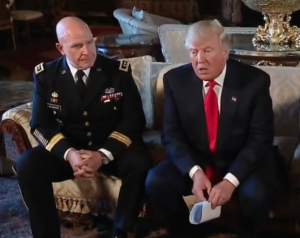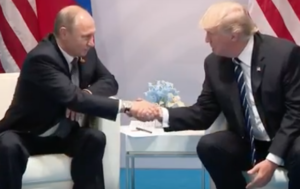
Gilbert Doctorow
Gilbert Doctorow is a Brussels-based political analyst. His latest book Does Russia Have a Future? was published in August 2015.
Under fierce attack from the moment of his stunning election, President Trump has failed to pursue a coherent foreign policy as he mixes and matches old-style belligerence with an ad hoc pragmatism, explains Gilbert Doctorow.
President Trump’s foreign policy has been an incredible mishmash of contradictions, perhaps partly a result of unsuccessful tactical concessions to keep his political enemies forever guessing his real intentions. But the underlying reality is that many of his personnel choices have created an organizational chart that would fit the agenda of a neoconservative president.

President Donald Trump announces the selection of Gen. H.R. McMaster as his new National Security Adviser on Feb. 20, 2017. (Screen shot from Whitehouse.gov)
Trump has appointed a great many advisers and administrators at odds with his America First vision, people such as National Security Advisor H.R. McMaster; Fiona Hill of the National Security Council staff; Ambassador to the United Nations Nikki Haley; and Secretary of Defense James "Mad Dog” Mattis. None of them share Trump’s overall vision of having the United States step back from day-to-day running of the world and engaging in never-ending wars, refocusing the nation on rebuilding its infrastructure and job creation.
The announcement this past week that President Trump is proceeding with the nomination of Jon Huntsman to be the next U.S. Ambassador to Russia falls entirely in line with this pattern. Though Huntsman does not speak a word of Russian, he has great talents and professional experience as a diplomat, having served as George W. Bush’s ambassador to China. Yet, as the chair of the Atlantic Council, a pro-NATO/anti-Russia think tank, his world view is both clear and anti-Trump. Moreover, in his service in Beijing, Huntsman was solicitous of anti-regime forces, at times as disruptive as President Obama’s Ambassador to Russia Michael McFaul was in Moscow.
So, Donald Trump has assembled a foreign policy and security policy team that would give an incoming President Mike Pence the framework for a fully integrated Cold War administration if Trump were impeached or otherwise removed from office. With the possible exception of Secretary of State Rex Tillerson, Trump has not appointed anyone to positions requiring Senate confirmation who doesn’t fit this mold. Tillerson, the former Exxon/Mobil CEO, may share some of Trump’s more pragmatic goals but lacks any overriding strategic vision.
Beyond personnel, Trump has sought to show that he is no wimp by ordering a missile strike against Syria for an alleged use of chemical weapons and dropping the world’s largest conventional bomb on an Islamic State target in Afghanistan. But those demonstrations have not kept his detractors at bay for long, while making a muddle of his foreign policy, which the President has compounded by taking contradictory positions from day to day, such as when he threw Poland an anti-Russia bone before making a display of friendship with Russian President Vladimir Putin at the G-20 summit in Germany.
The ‘Secret’ Meeting
This past week’s supposedly sensational news about a second "secret” meeting between Trump and Putin during the G-20’s festive dinner may offer a more accurate insight into Trump’s approach to foreign policy. The meeting took place in the presence of all the other heads of state, but nonetheless was exceptional insofar as it defied protocol. The U.S. President sat down next to Putin for a tête-à-tête without any of the U.S. delegation present and relying solely on the Russian interpreter to facilitate the conversation.

Russian President Vladimir Putin meets with U.S. President Donald Trump at the G-20 summit in Hamburg, Germany, on July 7, 2017. (Screen shot from Whitehouse.gov)
A Washington Post editorial focused on this fact: "To carefully calibrate messages to world leaders, presidents usually rely on an elaborate bureaucratic machine, including the interagency process and the National Security Council staff. Mr. Trump’s dinner chat showed once again his proclivity to act alone, and he undoubtedly created headaches. With no U.S. note-taker or interpreter, the U.S. national security structure was left without a record of the exchange, except for Mr. Trump’s memory.”
I would differ with the Post’s analysis in one key respect: Trump’s "proclivity to act alone” was not some ad hoc capricious act; it is the essence of his method of rule. Trump has chosen not to blend in with the status quo or to do things like other presidents have, but to run things as he did the Trump business empire, through a tiny circle of family members and trusted retainers operating outside any traditional corporate structure.
However, by rejecting past protocols and relying on non-expert friends and relations, Trump may be giving impetus to the drive to remove him from office. Policies built by Trump’s hands-on style are intrinsically no better than the policies built on an established bureaucracy, even one that has perpetuated its own secrecy and lies. Neither approach fulfills the principles of a democracy in which officials should be open and accountable to the citizens.
Today’s front page news that Trump accepts the latest congressional sanctions bill now before the House — directed against North Korea, Iran and Russia — is still more evidence of Trump’s lack of a coherent foreign policy. The bill, if enacted, will be a major obstacle to any improved or even normalized relations with Russia. It seeks to destroy the Russian-German Nordstream II project by targeting European partners and implementers and thus has raised the alarm of the otherwise tame, if not subservient, European Commission. And it goes against the entire logic of Trump’s foreign policy.
If Trump were to act like someone interested in defending the agenda that he ran on — refocusing the U.S. government on rebuilding America rather than trying to run the world — he would be rallying his supporters and reaching out to the broad public to educate them about the folly and likely harm of the sanctions bill. He would openly fight it by threatening a veto and making his position crystal clear. Instead, he is falling into line with the Washington Consensus.
How much longer must we wait for a government that opens its plans to a meaningful public debate and then implements those plans through the proper channels of dedicated and knowledgeable public servants?



.jpg/250px-ElbeDay1945_(NARA_ww2-121).jpg)





